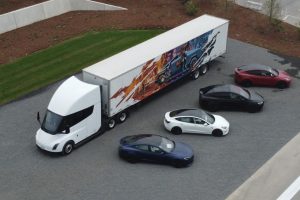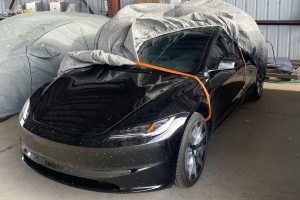- 😲 Tesla and Elon Musk’s visit to China has left India feeling shocked and disappointed after Musk postponed his visit to India, citing “very heavy Tesla obligations.”
- ❓ Indian media outlets are questioning whether Tesla’s decision to meet with Chinese officials instead of India to discuss a potential Gigafactory was due to “shoddy ethics or simply business.”
- 🏭 Tesla has been in talks with India for nearly a decade about establishing a Gigafactory, and an announcement was expected during Musk’s originally planned visit.
- 🤖 The “heavy Tesla obligation” that prompted Musk’s postponement may have been related to securing an agreement with Chinese officials on the rollout of Tesla’s Full Self-Driving suite.
- 🔀 Tesla’s shift in focus to China has fueled political tensions in India, with opposition leaders criticizing the government’s regulatory policies as a factor driving businesses away.
- ⏳ Tesla has not yet rescheduled Musk’s visit to India, leaving the potential Gigafactory plans in limbo amid ongoing geopolitical tensions between China and India.
Tesla’s recent visit to China and Elon Musk’s postponement of his planned trip to India have left the South Asian nation feeling perplexed and disheartened. The electric vehicle giant’s shift in focus has ignited a heated debate, with Indian media outlets and political figures questioning whether the move was driven by “shoddy ethics or simply business.”
As the dust settles, it is crucial to examine the factors that may have influenced Tesla’s decision and explore the broader implications of this incident on the company’s global aspirations and the delicate geopolitical dynamics at play.
A Decade of Anticipation and Uncertainty
For nearly a decade, Tesla has been engaged in discussions with the Indian government about establishing a Gigafactory in the country. The prospect of this investment was met with great anticipation, as it promised to bolster India’s burgeoning electric vehicle industry and create thousands of jobs.
However, as the years passed, negotiations seemed to stall, and a firm commitment from Tesla remained elusive. Musk’s recent postponement of his visit, citing “very heavy Tesla obligations,” has only added fuel to the fire of uncertainty, leaving many in India questioning the company’s true intentions.
The Lure of the Chinese Market
One potential explanation for Tesla’s shift in focus towards China lies in the immense market opportunity that the world’s most populous nation presents. With a rapidly growing middle class and an increasing emphasis on sustainable transportation, China has emerged as a critical battleground for electric vehicle manufacturers.
By securing an agreement with Chinese officials on the rollout of Tesla’s Full Self-Driving suite, Musk may have been prioritizing the company’s immediate market goals over the long-term prospects of a Gigafactory in India. This decision, while pragmatic from a business standpoint, has undoubtedly ruffled feathers in India, where the government and the public alike had pinned their hopes on Tesla’s commitment to the country.
Geopolitical Tensions and Regulatory Uncertainties
Beyond the purely economic considerations, Tesla’s decision has also ignited a political firestorm in India. Opposition leaders have seized the opportunity to criticize the government’s regulatory policies, suggesting that businesses are increasingly turning to China due to a lack of faith in the Modi administration’s approach.
This sentiment highlights the delicate interplay between business objectives and geopolitical tensions, as companies like Tesla navigate the complex web of diplomatic relations and regulatory frameworks that govern international trade and investment.
The Road Ahead: Rebuilding Trust and Confidence
As the dust settles, Tesla finds itself at a crossroads. The company must carefully assess its priorities and determine the best path forward, balancing the allure of the Chinese market with the long-term potential of the Indian subcontinent.
Rebuilding trust and confidence with the Indian government and public will be paramount. Clear and transparent communication, coupled with a genuine commitment to the country’s aspirations, could go a long way in repairing the damage caused by the perceived slight.
Moreover, Tesla must demonstrate a willingness to navigate the regulatory landscape with patience and diplomacy, recognizing the intricate web of geopolitical considerations that shape the business environment in different regions.
Conclusion
Elon Musk’s visit to China and the subsequent postponement of his trip to India have ignited a firestorm of controversy and debate. While the motivations behind Tesla’s decision may be rooted in pragmatic business considerations, the fallout has exposed the delicate interplay between economic goals and geopolitical realities.
As Tesla navigates this complex landscape, it must strike a careful balance between capitalizing on market opportunities and fostering trust and goodwill with key stakeholders. By embracing transparency, demonstrating a genuine commitment to its partners, and navigating regulatory frameworks with diplomacy, the company can pave the way for long-term success and sustainable growth in emerging markets worldwide.
Ultimately, this incident serves as a poignant reminder that in the globalized world of business, ethics, diplomacy, and strategic decision-making are inextricably intertwined, shaping the trajectories of companies and nations alike.





